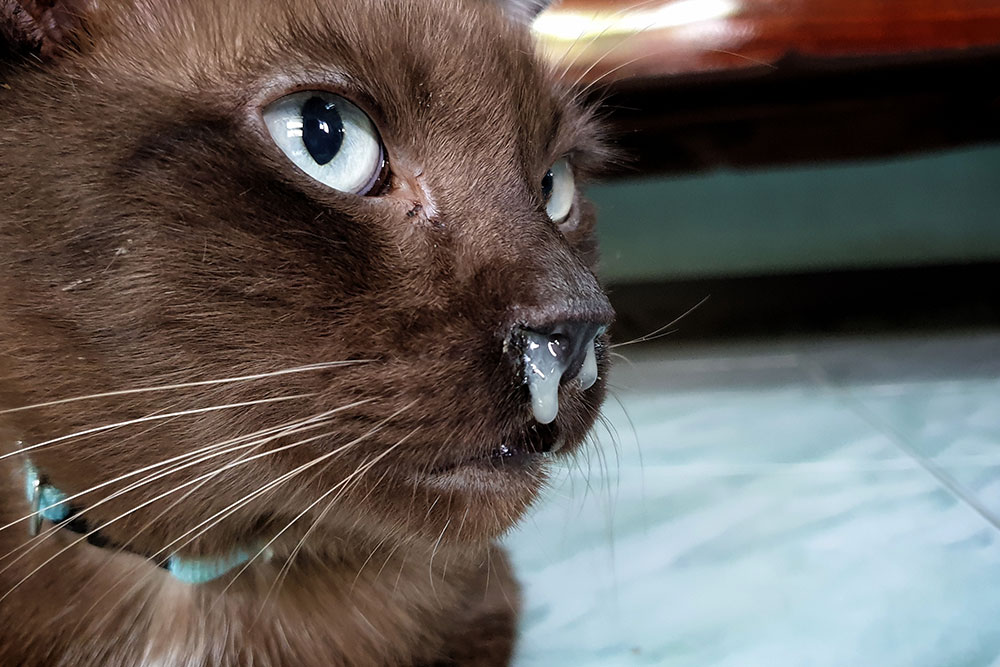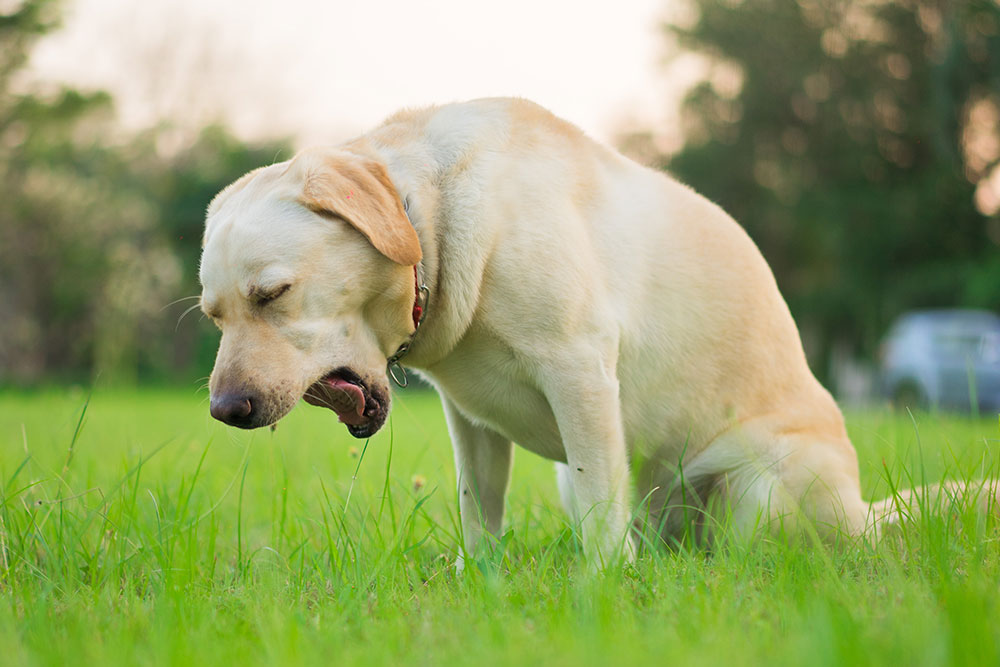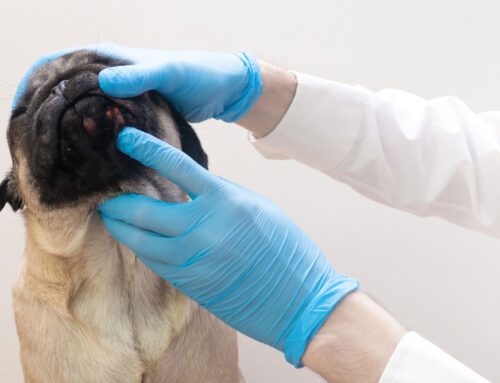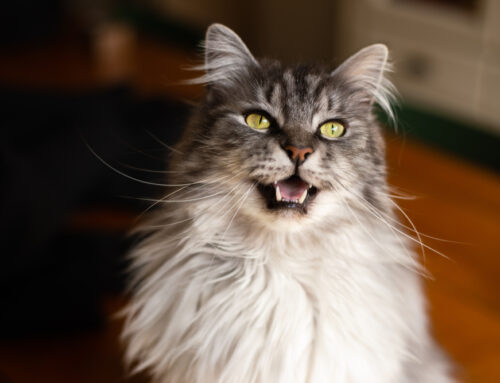Coughing, Sneezing, and More: What’s Behind Your Pet’s Noisy Breathing?
A sudden coughing fit, odd wheezing, or even unusually loud snoring can leave pet owners wondering if these symptoms are harmless or a warning sign. While allergies or mild infections may be the cause, other issues like heart disease, collapsing trachea, or pneumonia require urgent care.
At Palisades Veterinary Hospital in Fountain Hills, AZ, our AAHA-accredited clinic combines advanced diagnostics with personalized treatment plans to uncover the cause of your pet’s symptoms and help pets breathe comfortably again.
Understanding Common Respiratory Sounds in Pets
Unusual respiratory sounds in pets, like coughing, sneezing, or wheezing, can range from harmless to serious. Understanding what each sound means is the first step in knowing when to monitor and when to seek veterinary care.
Coughing: More Than Just a Kennel Cough
When your dog develops a persistent cough, it’s natural to suspect kennel cough, especially if they’ve recently been boarded or socialized. While kennel cough is common and often mild, it’s just one component of a broader group of illnesses known as canine infectious respiratory disease complex (CIRDC), which includes multiple bacteria and viruses that inflame the airways and cause that classic dry, hacking sound. These infections typically resolve with rest and medication, but secondary infections can worsen into pneumonia if left untreated.
Coughing can also signal far more serious internal conditions. Heart disease, for example, is one of the most concerning causes of chronic coughing in dogs and cats. There are a number of different causes of heart disease- including heartworm disease. As the heart struggles to pump efficiently, fluid may accumulate in the lungs, producing a distinctive “wet” or “gurgling” cough that worsens at night or when lying down. Recognizing the early signs of heart disease– such as exercise intolerance, fainting, or rapid breathing- is critical for early intervention and improved prognosis.
Another frequent cause of chronic coughing is a collapsed trachea, especially in small or toy breeds. This condition occurs when the rings of cartilage supporting the trachea weaken, narrowing the airway and triggering a distinctive “goose-honk” cough. It often flares during excitement, exercise, or pressure from a collar. Our internal medicine specialists use advanced imaging and fluoroscopy to grade tracheal collapse severity and create tailored treatment plans. Mild cases respond to cough suppressants, weight management, and harness use, while severe cases may require surgical intervention or tracheal stent placement.
At Palisades Veterinary Hospital, our comprehensive diagnostic tools– including chest X-rays, echocardiograms, and bloodwork- allow us to distinguish between upper airway irritation, heart disease, and infectious respiratory illness quickly and accurately.
Sneezing: Allergies or Something More?
Occasional sneezing can be perfectly normal, but frequent or severe sneezing episodes can indicate underlying irritation or infection. In Arizona’s desert climate, airborne irritants such as dust, pollen, and mold are common triggers for allergic rhinitis in both dogs and cats. Managing pet allergies effectively often involves identifying seasonal or environmental allergens and adjusting air filtration, cleaning routines, and medications accordingly.
In cats, chronic sneezing often points to a feline upper respiratory infection, typically caused by feline herpesvirus or calicivirus. These infections are highly contagious, particularly in boarding or shelter environments, and may also cause nasal congestion, watery eyes, ulcers on the tongue, or loss of appetite. Cats under stress- such as during travel or environmental changes- are particularly prone to flare-ups.
Physical obstructions can also trigger sneezing fits. Foxtails, or barbed grass seeds, can become embedded in the nasal passages, leading to violent sneezing, nosebleeds, and discharge from one nostril. Because foxtails migrate deeper over time, prompt veterinary removal is essential to prevent infection or sinus damage.
Wheezing and Reverse Sneezing: What’s Normal?
Reverse sneezing- the sudden, noisy inhalation that sounds like a snort or gasp- is common in dogs and can occur after excitement, pulling on the leash, or exposure to irritants. While generally harmless and self-limiting, frequent episodes may suggest an underlying trigger such as allergies, sinus inflammation, or an elongated soft palate.
True wheezing, by contrast, suggests airflow obstruction within the lower airways or lungs. In cats, wheezing is a hallmark of feline asthma, a chronic inflammatory condition similar to human asthma. Triggers include dust, smoke, and stress, which cause airway constriction and mucus buildup. During an asthma attack, cats may crouch with their neck extended, breathe rapidly, or cough. Treatment usually involves bronchodilators, corticosteroids, and environmental control. In dogs, wheezing can accompany allergic bronchitis or lung infections that require advanced imaging and pulmonary evaluation.
Snoring: When to Be Concerned
A gentle snore can be endearing, but loud or new-onset snoring may point to structural or inflammatory airway problems. Brachycephalic Obstructive Airway Syndrome (BOAS) commonly affects short-nosed breeds like Bulldogs, Pugs, and Persian cats. Their compact skull shape narrows nasal passages and elongates the soft palate, restricting airflow and causing chronic snorting, gagging, or fainting episodes. Weight management, humidity control, and corrective surgery can help restore airflow and comfort.
In cats, chronic snoring sometimes signals the presence of nasopharyngeal polyps, benign growths in the back of the throat or ear canal. These polyps can cause noisy breathing, swallowing difficulty, or head shaking. Surgical removal is often curative and dramatically improves quality of life.
Recognizing Respiratory Distress in Pets
Knowing when noisy breathing crosses into an emergency is critical. Respiratory distress in pets can appear as open-mouth breathing in cats, blue-tinged gums, extended neck posture, or visible effort with each breath. Rapid intervention can save lives.
At Palisades Veterinary Hospital, our team provides emergency services that include oxygen therapy, imaging, and medications to stabilize breathing crises. We encourage pet owners to call ahead at (480) 837-0082 so our team can prepare before arrival and provide immediate assistance.
Preventative Respiratory Measures and Home Care for Pets
Preventive care remains the cornerstone of respiratory health. Regular exams and screenings allow early detection of heart disease, lung infections, and chronic inflammatory conditions before they cause breathing problems. Our in-house laboratory services include bloodwork, heartworm testing, and inflammatory markers to guide treatment before symptoms escalate.
Creating a Healthy Environment at Home
Reducing respiratory stress begins with a clean, controlled home environment. Replace air filters regularly, use fragrance-free cleaning products, and consider air purifiers for pets with allergies or asthma. Maintaining moderate humidity helps soothe airways and prevent dry nasal passages.
Proper nutrition and body weight are also critical- excess fat around the chest and neck can compress the lungs and exacerbate breathing problems, especially in warm climates. Exercise and diet adjustments can improve oxygen exchange and energy levels. For flat-faced breeds, minimizing exposure to heat and stress is especially important, as they overheat more easily and tire faster.

Building a Relationship with Your Veterinarian
A trusted veterinary partnership is essential for monitoring chronic or recurring breathing issues. At Palisades Veterinary Hospital, we guide pet owners in distinguishing between harmless snorts and symptoms that require medical attention. Regular communication about any changes in breathing, coughing, or energy levels allows for proactive management rather than emergency response.
Taking Action for Your Pet’s Respiratory Health
Breathing issues that persist, worsen, or interfere with eating, sleeping, or activity require immediate evaluation. Our diagnostic and emergency services ensure your pet receives the right care when respiratory function is compromised.
If you notice concerning breathing changes, request an appointment online or call us directly at (480) 837-0082. The team at Palisades Veterinary Hospital is ready to help your pet breathe easier and live more comfortably.







Leave A Comment